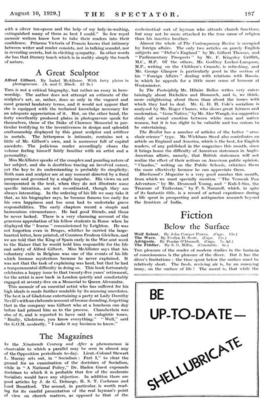A Great Sculptor
Alfred Gilbert. By Isabel McAllister. With forty plates in photogravure. (A. and C. Black. £2 2s.) Tins is not a critical biography, but rather an essay in hero- worship. The author does not attempt an estimate of the sculptor's art, or, rather, does so only in the vaguest and most general laudatory terms, and it would not appear that she is equipped with the technical knowledge necessary for an adequate appreciation of it. But, on the other hand, the forty excellently produced plates in photogravure speak for themselves, those of the Duke of Clarence Memorial in par- ticular testifying to the inventiveness in design and splendid craftsmanship displayed by this great sculptor and artificer in metals. The letterpress is intimate, contains not a little of Mr. Gilbert's own, and is moreover full of capital anecdote. The judicious reader accordingly closes the volume feeling himself fairly familiar with an artist and a personality.
Miss McAllister speaks of the complex and puzzling nature of her subject, and she is doubtless tracing an involved career, yet the key to its understanding is probably its simplicity. Both man and sculptor are at any moment directed by a fixed purpose and governed by a single impulse. His views on art incorporated in the text, when they do not illustrate some specific intention, are not co-ordinated, though they are always interesting. In the ordering of his life we may take it that, as his biographer says, he became famous too early for his own happiness and too soon had to undertake grave responsibilities. The early chapters record a simple and harmonious circumstance. He had good friends, and those he never lacked. There is a very charming account of the generous approbation of his fellow students in Rome when he displayed the " Icarus " commissioned by Leighton. He was not forgotten even in Bruges, whither he carried the large- hearted letter, here printed, of Countess Feodora Gleichen, and we are told that the King of Spain early in the War sent word to the Kaiser that he would hold him responsible for the life and safety of Alfred Gilbert. Miss McAllister says that his voluntary exile in Belgium was One of the events of his life which became mysterious because he never explained. It was not that the task of explaining was hard, but that he had a temperamental difficulty in doing so. This book fortunately celebrates a happy issue to that twenty-five years' retirement, for the artist is now back in London quietly and comfortably engaged at seventy-five on a Memorial to Queen Alexandra.
This memoir of an essential artist who has suffered for his high ideals is made further readable by its amusing anecdotes. The best is of Gladstone entertaining a party at Lady Dorothy Nevill's with an elaborate account of bronze-founding, forgetting that in the company was Gilbert who at a luncheon one day before had primed him as to the process. Chamberlain was also of it, and is reported to have said in eulogistic tones, " Really, Gladstone, you know everything." "Well," said the G.O.M. modestly, "I make it my business to know."
































 Previous page
Previous page